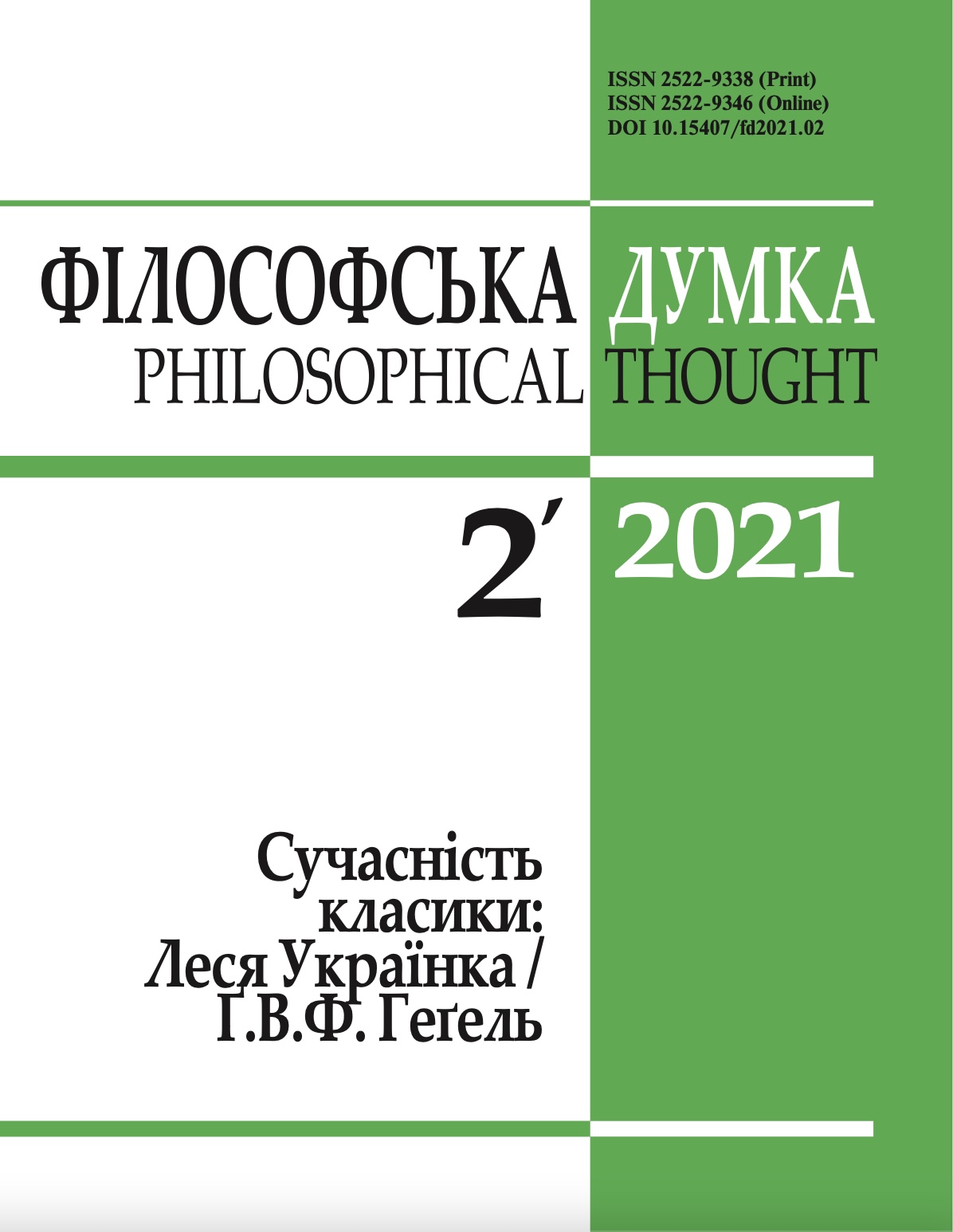LESIA UKRAINKA, DON JUAN AND EUROPE: IDEOLOGY AND EROPOLITICS IN THE STONE MASTER
DOI:
https://doi.org/10.15407/fd2021.02.049Keywords:
Lesia Ukrainka, Don Juan, Tirso de Molina, Molière, Mozart, Hoffmann, Grabbe, epochs, romanticism, post-romanticism, Nietzsche, freedom, power, authoritarianism, totalitarianism, eropolitics, Ukrainian cultureAbstract
The article is focused on Lesia Ukrainka’s famous drama The Stone Master (Kaminnyi Hos- podar), her remake of the Don Juan legend. The author of the article, Ukrainian philosopher Volodymyr Yermolenko, localizes Lesia’s masterpiece in a broader European tradition of the leg- end. He compares The Stone Master with the previous version of the Don Juan legend, by Tirso de Molina (The Trickster of Seville), Moli re (Dom Juan), Mozart (Don Giovanni), Hoffmann (Don Juan), Grabbe (Faust and Don Juan) and others. He analyzes Lesia’s originality within this tradition. He also reads The Stone Master in the context of the dialogue between different epochs: the Baroque, Classicism, Rococo / Enlightenment, Romanticism, Post-Romanticism. Each of the epochs develops its specific version of Don Juan legend, according to Yermolenko, which re- flects a specific concept of human being and human relations developed at each particular period. While the “Baroque” Don Juan of Tirso de Molina marks the crisis of the culture of honor, the “Classicist” Don Juan of Moli re shows the development of a culture of knowledge and general concepts, and the “Romantic” Don Juan of Byron and Hoffmann is a symptorm of a new 19th century culture of will and transformation. In this respect, it is important to look at Lesia Ukrain- ka’s text as a battleground of “Romantic” will to freedom and “Post-Romantic” (or fin de siècle) will to power. In this context, Yermolenko reads The Stone Master (written in 1912) as a criticism of the fashionable topic of “will to power”, and as a political warning, with Lesia Ukrainka show- ing the upcoming horrors of the 20th century’s authoritarianism and totalitarianism. With the help of the concept of eropolitics, the author shows how, through the erotic topic, Lesia Ukrainka passed a major political message to her epoch — and ours as well.
References
Agathon [Henri Massis, Alfred de Tarde] (1913). Les jeunes gens d'aujourd'hui. Paris: Libraire Plon.
Ballanche, P.-S. (1827). Essais de palingénésie sociale. Paris: Imprimerie de Jules Didot Ain.
Bruckner, P. (2005). L'amour du prochain. Paris: Grasset.
Byron, G.G. (2009). Don Juan. Overland Park: Digireads.com Publishing.
Demetz, P. (1997). Prague in Black and Gold. New York, Farrar, Straus and Giroux. Kindle Edition.
Derrida, J. (1963). Cogito et histoire de la folie. Revue de métaphysique et de morale, 68 (4), 460-494.
Dontsov, D. (1922). The Poet of the Ukrainian Risorgimento [In Ukrainian]. Lviv: Vydavdnytstvo Dontsovykh.
Drai-Khmara, M. (1926), Lesia Ukrainka. Life and Work [In Ukrainian]. Kyiv: Derzhavne Vydavnytstvo Ukrainy.
Foucault, M (1966). Les mots et les choses. Paris: Editions Gallimard.
Gendarme de Bévotte, G. (1993). La Légende de Don Juan: son évolution dans la littérature des origines au romantisme. Genève: Slatkine Reprints.
Goehr, L., Herwitz, D. (Eds.) (2006). The Don Giovanni Moment. Essays on the Legacy of an Opera. New York: Columbia University Press.
https://doi.org/10.7312/goeh13754
Grabbe, C.D. (1963). Don Juan und Faust. Stuttart: Reclam.
Haydn, H. (1950). The Counter-Renaissance. New York: Charles Scribner's Sons.
Heigl, A (2010). Christian Dietrich Grabbes Zeitkritik in «Don Juan und Faust». Muenchen: GRIN Verlag.
Hoffmann, E.T.A. (2013). Don Juan. In: E.T.A.Hoffmann, Gesammelte Werke. S.l.: Null Papier Verlag.
Karpiak, R. (1982). Don Juan: A Universal Theme in Ukrainian Drama. Canadian Slavonic Papers / Revue Canadienne des Slavistes, 24 (1), 25-31.
https://doi.org/10.1080/00085006.1982.11091689
Kosach-Kryvyniuk, O. (1970) Lesia Ukrainka. The Chronology of Life and Work. [In Ukrainian]. New York: Ukrainska Vilna Akademiya Nauk.
Lesia Ukrainka (2021). Stone Master. [In Ukrainian]. In: Lesia Ukrainka, Full Academic Col- lection of Works (vol. 4, pp. 67-150). Lutsk: Volynskyi natsionalnyi universytet imeni Lesi Ukrainky.
Lesia Ukrainka (2018). Correspondence, 1903-1913]. [In Ukrainian]. Kyiv: Komora, 2018.
Molière (2017). Dom Juan ou le Festin de Pierre. S.l.: Géraldine Classique.
Schnitzler, A. (1918). Casanovas Heimfahrt. Berlin: Fischer Verlag.
Steen, M. (2012). Mozart's Don Giovanni. A Short Guide to a Great Opera. London: Icon Books Ltd.
Sheveliov, Y. (2009). Lesia Ukrainka's Theatre or Lesia Ukrainka in Theatre? [In Ukrainian]. In: Yu. Sheveliov, Selected Works (vol. 2, pp. 247-258). Kyiv: PH "Kyievo-Mohylianska Aka- demiya".
Stendhal (1822). De l'Amour. In: Stendhal, L'oevres complètes. S.l.: Arvensa Editions.
Stendhal (2019). Les Cenci. S.l.: Editions Synapses.
Sullivan, H.W. (1976). Tirso de Molina and the Drama of the Counter Reformation. Amsterdam: Ro dopi.
Tapié, V.-L. (1957). Baroque et classicisme. Paris: Hachette.
Watt, I. (1997). Myths of Modern Individualism. Faust, Don Quixote, Don Juan, Robinson Crusoe. Palo Alto: Standford University Press.
https://doi.org/10.1017/CBO9780511549236
Waxman, S.M. (1908). The Don Juan Legend in Literature. The Journal of American Folklore, 21 (81), 184-204.
https://doi.org/10.2307/534636
Yermolenko, V. (2015). Distant People, Close People. [InUkrainian]. Lviv, Vydavnytstvo Staroho Leva.
Zabuzhko, O. (2007). Notre Dame d'Ukraine. Ukrainka in the conflict of mythologies. [In Ukrainian]. Kyiv: Fakt.
Zerov, M. (2015). "Lesia Ukrainka". [In Ukrainian]. In: M. Zerov, Collected Works (pp. 512-565). Kyiv: Smoloskyp.
Downloads
-
PDF (Українська)
Downloads: 364
Published
How to Cite
Issue
Section
License
Authors who publish with this journal agree to the following terms:
- Authors retain copyright and grant the journal right of first publication.
- Authors are able to enter into separate, additional contractual arrangements for the non-exclusive distribution of the journal's published version of the work (e.g., post it to an institutional repository or publish it in a book), with an acknowledgement of its initial publication in this journal.
- Authors are permitted and encouraged to post their work online (e.g., in institutional repositories or on their website) prior to and during the submission process, as it can lead to productive exchanges, as well as earlier and greater citation of published work (See The Effect of Open Access).


